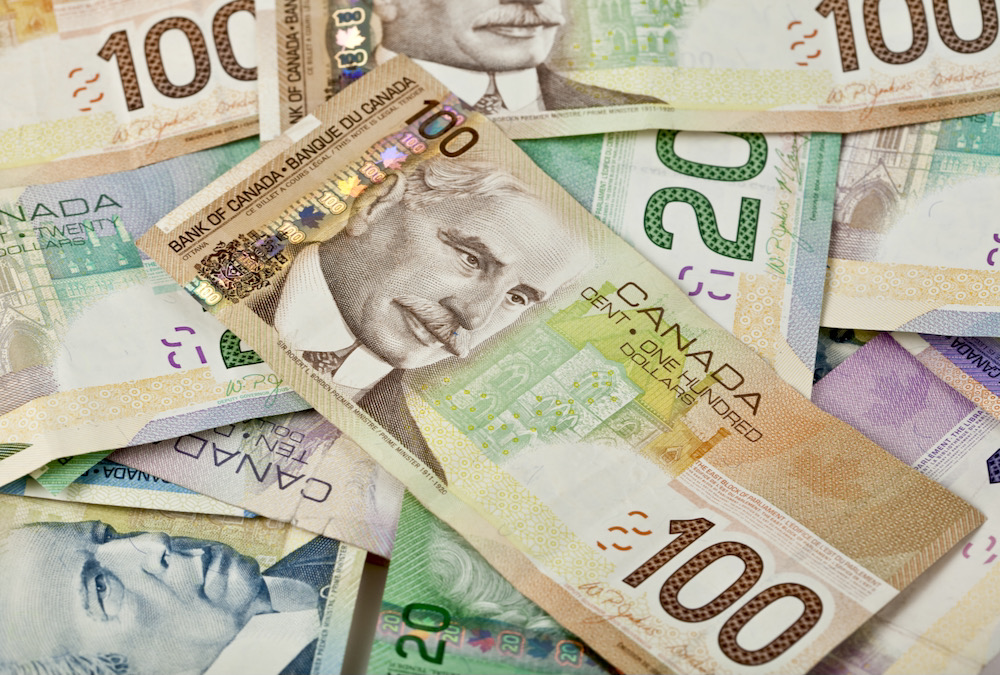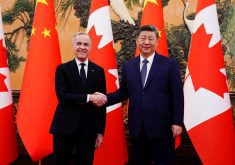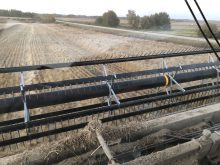Farmers across Canada are paying a 35 per cent federal tariff on fertilizers purchased from Russia prior to the war.
Those regulations have placed a huge price disadvantage for Ontario’s, and Canada’s, crops.
“We recognize the mistakes the Russian government has made in invading Ukraine, but making farmers, and ultimately Canadian consumers, pay for a tariff during high inflation and a time of increasing food shortages is unfair and unwise, especially when most purchases were made prior to the war,” said Ontario Bean Growers’ chair Dave Woods,
Read Also

OPINION: Ag Days 2026 moved talk from trade anxiety to tactics
Farmers, speakers and exhibitors at Manitoba Ag Days 2026 were again talking trade uncertainty and tariffs, but this year’s tone felt more proactive.
The growers are calling on the federal government to return the fertilizer tariffs entirely, or at least for those purchases made before the current conflict, and invest in domestic fertilizer production in the long term.
There is also a call for federal examination of major trading partners such as the U.S., “to assess the disparity on costs caused by the Canadian regulations,” Woods said.
A coalition of farm groups affected by the tariff, including the Ontario Bean Growers, as well as the Grain Farmers of Ontario (GFO), has been formed. The group released a statement last week calling on the federal government to support farmers who are severely impacted by the tariffs.
Farm organizations from across Canada have asked the federal government to lift tariffs or return the funds to producers. Canada is the only G7 country that has this tariff in place, which penalizes Canadian farmers, the coalition said.
The U.S. government has removed its tariffs on fertilizer imports from Russia, and all other members of the G7 have no tariffs on fertilizer.
In Canada, the federal government has refused to listen to the plight of Canadian farmers on the high fertilizer costs that the government has helped create, the coalition said.
“Our farmers are doing everything they can to reduce fertilizer usage as it is one of the highest input costs,” Woods said in a July 20 statement, “However, there is only so much we can do before yields are affected for this year and next year.
“The government does not understand the impact they have on our farmers’ ability to grow food. Whether carbon taxes, import tariffs, diesel taxes, pesticide bans, supply chain disruptions, lingering COVID vaccine mandates, rail strikes (or) fertilizer reduction regulations, the government is constantly making farmers wonder if they can continue to operate and grow food in Canada.”
Russia is the world’s number one exporter of nitrogen fertilizer and the second largest of phosphorus and potassium fertilizers.
Ontario exports 90 per cent of its bean crop and the additional 35 per cent tariff will make Ontario and Canadian farmers’ sales even more difficult to remain competitive with their American neighbours, the coalition said.
It added that farmers have reduced their need for fertilizer through crop rotation, cover crops (such as growing nitrogen-producing cover crops before corn), and alternative sources of nutrients like livestock manure. Unfortunately, there is not enough manure from animals to meet the demand and nutrients aren’t as measurable in manure as they can be with commercial fertilizers. Manure, a natural fertilizer, has also been negatively targeted by the federal government’s climate change policy discussions.
The removal of fertilizers will reduce yields, which play against other government targets to increase agricultural production and exports.
The coalition said farmers ensure they are applying the correct amount of fertilizer by testing soils and applying only what is needed. But crops like kidney beans, black beans and pinto beans still require the proper amount of nutrients to grow. Reducing applied fertilizer isn’t a great option for Canadian farmers when the world is relying on Canada to produce more to meet Ukraine’s crop shortage due to the war with Russia.
“Unfortunately, we feel that food prices are going to continue to rise,” Woods said. “This will be com- pounded, again, by whether farmers in the Ukraine are able to harvest and export crops this year as they are a major exporter of grains such as corn and wheat.”
Canada has the potential to supply all its own nitrogen fertilizer, which is made from natural gas. However, this takes policy support by the federal government and time, which farmers don’t have for the next season.
Without the removal of the tariff and assistance by the federal government, the coalition said prices will continue to increase for farmers and consumers.















